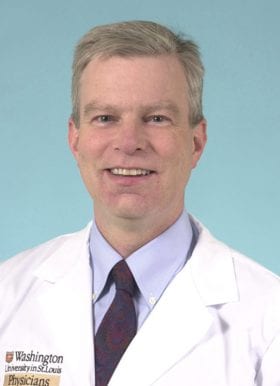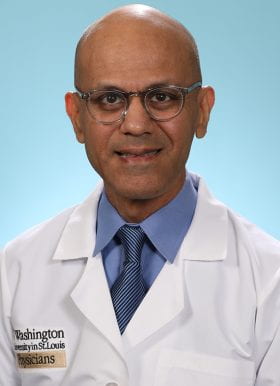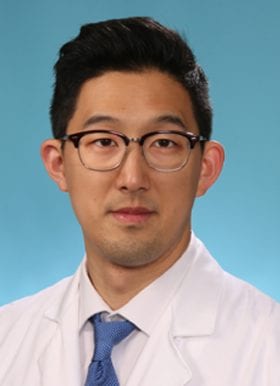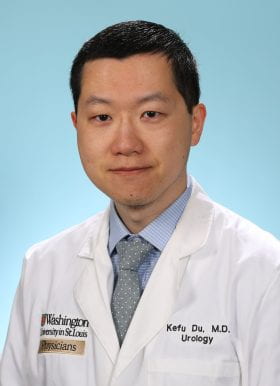Washington University offers fellowships in laparoscopic/robotic urology and endourology/stone disease. Salary support for two fellows per year is generously funded by Midwest Stone Institute. Dr. Ralph V. Clayman started the fellowship in 1984. The fellowship has a long tradition of training excellent urologists. Many of today’s leaders in urology are graduates of the fellowship at Washington University.
The current fellowship can be tailored to fit the fellow’s desired experience and post-fellowship career goals. The fellow can choose to do:
- Two-year combined fellowship
- One-year laparoscopic / robotic
- One-year endourology / stone disease
- One-year combined fellowship
Contact Information
R. Sherburne Figenshau, MD – Fellowship Program Director
Email: figenshaur@wustl.edu
Gina Yu – Fellowship Program Coordinator
Email: yu.g@wustl.edu
Current Fellowship Faculty

R. Sherburne Figenshau, MD
Taylor Family and Ralph V. Clayman Chair in Minimally Invasive Urology
Director of Endourology Fellowship
Professor of Surgery, Division of Urology
- Email: figenshaur@nospam.wustl.edu

R. Sherburne Figenshau, MD
Taylor Family and Ralph V. Clayman Chair in Minimally Invasive Urology
Director of Endourology Fellowship
Professor of Surgery, Division of Urology
- Email: figenshaur@nospam.wustl.edu

Sam B Bhayani, MD
Holekamp Family Endowed Chair in Urology, Chief of Urologic Surgery
- Division of Urologic Surgery
Chief Medical Officer, Faculty Practice Plan
Co-Director of Robotic Surgery

Eric H. Kim, MD
Associate Professor of Surgery
Director of Research, Division of Urologic Surgery
Clinical Responsibilities
The fellow functions as a junior faculty member (Clinical Instructor) with clinical, research, teaching and administrative responsibilities. He/she participates in the attending on-call pool. The fellowship is heavily weighted toward experience in the operating room in advanced robotic, laparoscopic, and endourological procedures. The clinical sites include Barnes-Jewish Hospital (Siteman Cancer Center), Barnes-Jewish West County Hospital, and Christian North East Hospital. All sites have daVinci robots including Si and Xi systems with dual consoles (total of 6). In the 2019-2020 academic year, Barnes-Jewish Hospital acquired a DaVinci single port robot and console to utilize for oncological and reconstructive cases.
The fellows have attending privileges. In some cases, the fellows are in a training situation with a faculty mentor, and in other situations, the fellows supervise the residents during operative cases. Fellows obtain independent robotic privileges early in their fellowship. In addition, fellows are encouraged to become proficient in obtaining their own percutaneous renal access including experience with renal ultrasonography. A unique experiences include a large volume of retroperitoneal robotic partial nephrectomies as well as retroperitoneal approach for pyeloplasties and adrenalectomies.
The combined case numbers (excluding the VA) are shown below for August 1st 2018 to August 1st 2019.
| PCNL | 157 |
| Ureteroscopy | 1098 |
| SWL | 63 |
| Laparoscopic / Robotic Nephrectomy | 139 |
| Lap/Robotic Prostatectomy | 380 |
| Robotic Partial Nephrectomy (transperitoneal + retroperitoneal) | 187 |
| Robotic Cystectomy | 11 |
| Robotic Nephroureterectomy | 25 |
| Robotic Ureterectomy / Reimplant | 4 |
| Robotic Bladder Neck Reconstruction | 5 |
| Robotic Pyeloplasty | 37 |
| Robotic Ureteroplasty with Buccal Graft | 6 |
| Prostate Cryoablation | 22 |
Research
Fellows will have access to Washington University Urology Data Repository (UDR) containing databases related to kidney cancer, prostate cancer and stone disease. The UDR has dedicated research staff that includes a full-time statistician. There is also a fully equipped translational minimally invasive research laboratory that includes animal facilities. The minimally invasive research laboratory also has a daVinci robot for training and educational activities. We encourage the fellows to get involved in multidisciplinary research projects. The fellow is expected to publish and present his/her work at national and international meetings.
Education
Our advanced laparoscopic/robotic dedicated training facility (WUMIS lab) is for training residents, medical students, and post-graduate students. The fellow has an opportunity to be involved with resident and medical student education and evaluation of minimally invasive techniques including 3-D printing and surgical simulation/surgical rehearsal.
All applicants should apply through the Endourology Society Fellowship Match. All fellows who complete the fellowship successfully will receive recognition from the Endourology Society.
